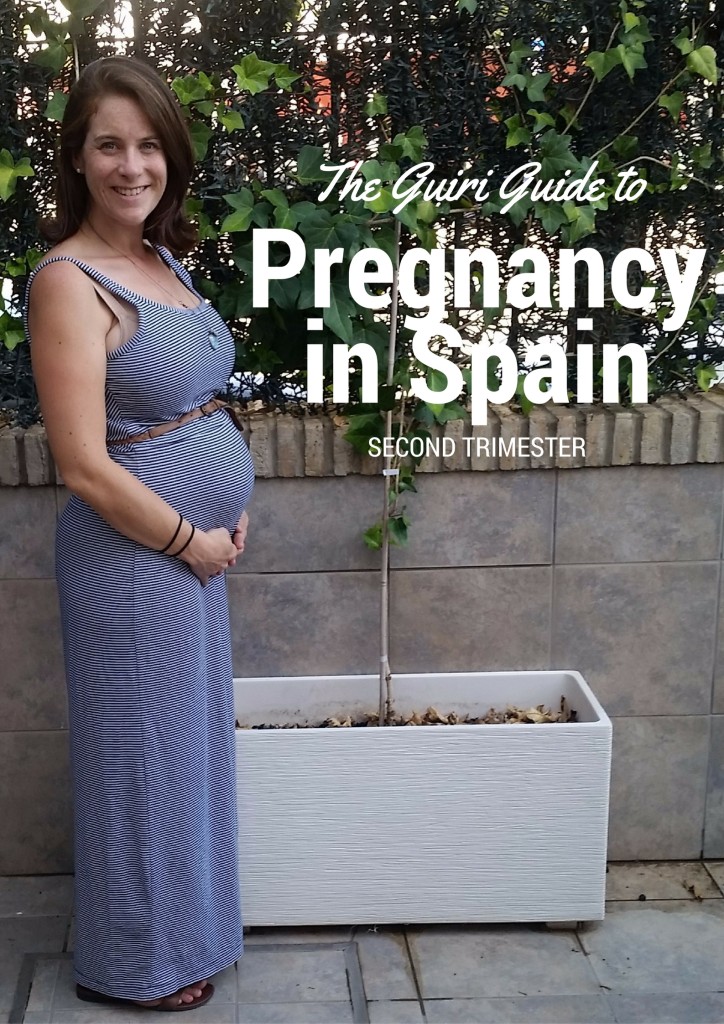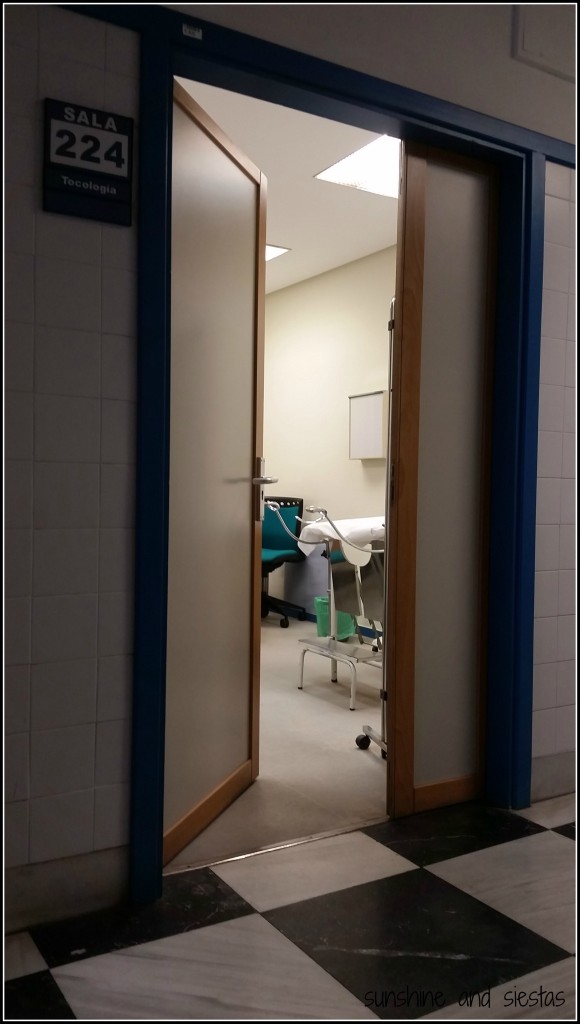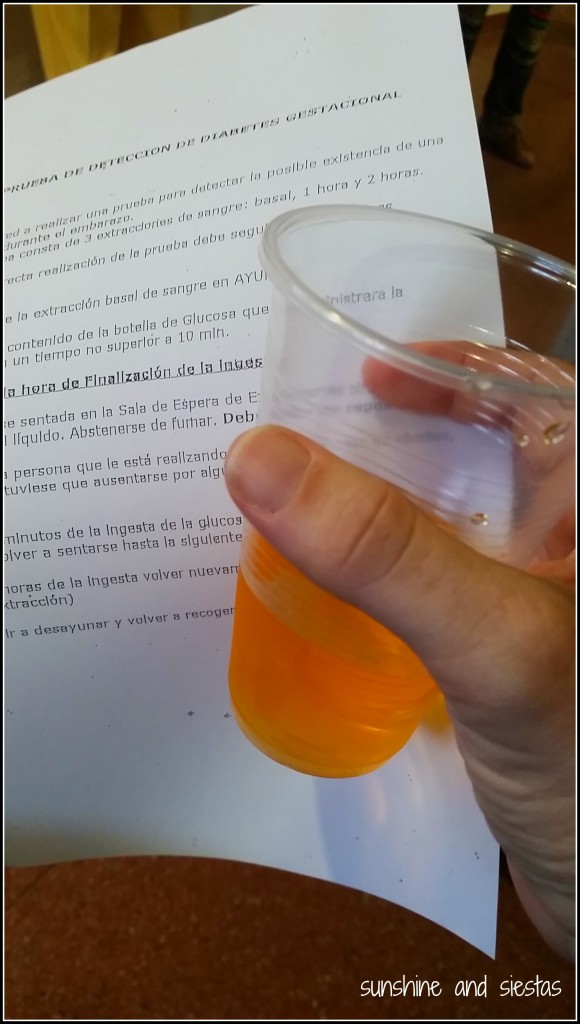The start of my second trimester, at 14 weeks, coincided with another big event in my life: Leaving Seville for a job and a new life in Madrid.
After a relatively uneventful first trimester, I found out that being pregnant in Spain – especially when your second trimester coincides with the hot summer months and the ghost town that is Madrid – was not going to be a cake walk (and what the hell is up with my lack of cravings for cake?!).
I can’t say I have complaints about how I felt during my first third of the pregnancy: no morning sickness, no noticeable weight gain, only nominal sleepiness. But the heat, looking for an apartment and drinking in a new city (and drinking cerveza sin and Nesteas in all of the old man bars we could find) meant afternoon naps and sitting down on benches any chance I got. For many weeks, I avoided eye contact on the Metro, particularly with old people, because I wasn’t big enough to warrant getting the coveted pregnant lady seat just yet.
Miss the English Guide to Pregnancy in Spain? Just click!
People say that the honeymoon period of any pregnancy falls between weeks 14 and 28, or your second third of the cooking. This is the time to exercise, to travel (we went to Asturias via car and I took a jaunt around Northern Europe for work) or to live life as you would have before the achy joints and doctor visits, to savor the moments before midnight feedings and being covered in baby dribble. Considering I’ve had an easy, low-risk pregnancy so far, my biggest complaints lie in the bureaucratic limbo I’ve been in and not to how my body has reacted to being pregnant.
This side eye goes straight to you, Comunidad de Madrid. But we’ll get there later.
Second Trimester tests and check ups
By the time I was making the transition to Madrid, I was almost ready to take the first apartment I saw because there was something more important in play: finding a doctor and signing up for local healthcare. After we signed a contract on a flat in Chamberí, I googled the nearest public health clinic and was delighted to find it within waddling distance of my house.
Centro Médico Espronceda took care of changing my health care from Andalucía to the Cupo Madrileño, promising a card would be mailed to me within the month (and it was!). In the meantime, they gave me a print off and took care of assigning me a médico de cabecera, or a primary care doctor, and nurse.
While I was allowed to make my own appointments with the primary care doctor and midwife, I was assigned to another medical center around the corner for by obstetrics appointments. This would be the doctor who refers me for tests required for prenatal care. My plan was to get everything out of the way before beginning my job at an estimated 16 weeks of pregnancy, but it didn’t work out that way…
Being new to the health system in Madrid – remember that every autonomous community in Spain has their own regulations regarding public healthcare – I knew that meant a few more visits than normal. Plus, I was looking for a private doctor and had a few Goldilocks moment: too stern, too aloof… until I found one at Clínica La Luz who was just right.
This second trimester has been marked by a slew of doctor’s appointments, to say the least, and mangled test results. Here are the big tests you’ll need to complete if you’ve got a healthy, low-risk pregnancy:
Analisís del segundo trimestre / second trimester blood and urine analysis: Sometime around the middle of your pregnancy, you’ll be instructed to have blood drawn and a urine sample tested for your sugar, protein and iron, plus toxoplasmosis, rubeola and AIDS. Remember to go en ayunas, or without eating or drinking anything but water.
In the public system in Madrid, test results of this nature are typically ready within three working days as opposed to a week in Seville.
Eco de las 20 semanas / The 20-week scan: Arguably the most beautiful moment of the pregnancy, 20 weeks marks the middle of gestation and the most thorough sonogram you’ll have. A doctor will check to be sure Baby has all its fingers and toes, that most of its organs are fully formed and that he or she is not over or underweight.
In fact, the baby is nearly fully formed at this point, so the last half of your pregnancy will be the time he or she gains weight, sprouts hair on the head, begins growing its lungs and continues to develop brain cells. If you’ve been waiting to find out the gender, you should be able to see the sex organs, too – but remember, be very specific if you prefer to wait! Spaniards tend to want to know as soon as possible, so I had to remind doctors that I was waiting until the 20 week scan so as to avoid mistakes.
Pro tip: I was told to consume a bit of sugar before the scan so that the baby would be active. It must have worked: we got the full frontal, so it was easy to determine the baby’s sex!
Curva de azúcar / glucose test: Also called the test O’Sullivan in Spain, you should have your glucose test between 24 and 28 weeks of your pregnancy. This tests for gestational diabetes and can take several hours to complete, depending on your pregnancy and your immediate test results. I decided to do my test in the public system, which I got done at the same time as my second trimester blood and urine exams.
People often complain about the sugary drink, which tasted like a cracked-out version the McDonalds orange pop that we drank after soccer matches as kids. I jokingly told them woman I’d chug it like a beer, college style, but she ordered me to consume it more slowly, in 5-10 minutes, and then sit. Someone will take blood again at one and two hours of consumption to determine your risk for gestational diabetes, which can provoke an overweight baby or preeclampsia. After the second hour, you’re allowed to have breakfast (what sane person deprives a pregnant lady of food?!) and walk around a bit. Thanks to the Novio feeding me plenty of legumes and fish, my margins were extremely low.
Tósferina / whooping cough shot: If your doctor merits it, you’ll have to also have a whooping cough shot around 28 weeks. I was told to put it off until after my third trimester scan to see if it was actually necessary.
Apparently you don’t keep your cartilla de embarazada with you, but at your doctor’s. This wouldn’t have been a big deal had it not been during summer vacation time – but I’ll tell you that story later.
Additionally, my doctor doesn’t make my appointments for me. After getting assigned a test or follow-up, you must make the appointment at the medical center: you can do this by phone or internet, or simply by waiting in line at your assigned center. In the stressful first weeks trying to schedule my 20-week scan, I was jockeyed between medical centers and put on a wait list, finally being called by the public system 30 minutes before an appointment – and I was in Seville for the weekend. My being proactive (as in, calling the sistema madrileño de salud out on their inability to adequately staff a public health clinic during the summer months) succeeded to a point, but even being an “urgente” case did nothing to give me any preference.
Once you do get in to the doctor, be sure to have your appointment print out, called a volante, with you. Rather than being polite and asking what time everyone else’s appointment is, you have to stalk the obstetrics nurse and shove your volante at her when she comes out to call a name. I suppose it’s better than the uncomfortable shuffle of times or cutting an abuelita in line, but I was scolded on more than one occasion for not presenting the paper and being skipped over.
If you don’t have a volante because you called for an appointment, flash a photo ID so that the nurse knows you’ve arrived.
The Autonomous Community conundrum
I was – and have been – optimistic about my pregnancy, and am taking it all in stride as my body stretches, droops and tires. Being proactive, I called my OB-GYN before he called me and made an appointment immediately. It wasn’t that I was concerned, but I wanted to be sure that I had my 20-week sonogram scheduled so that the Novio and I could find out the gender together.
Twenty weeks also coincided with our birthdays, which sweetened the deal.
The doctor ordered me to repeat the tests that he didn’t have access to, which was fine, despite a disorganized system at Hospital San Carlos and a two-hour wait, urine in hand. That afternoon, I went to my local clinic to make an appointment for the results with the hope of scheduling the 20-week scan.
I waltzed up to the appointments counter, flashed my brand-new card and presented the papers from the work up. Without looking up, the man shook his head and said that no one – NOT ONE DOCTOR – was available for the month of August. I laughed, “What do you mean? Every single obstetrician in this medical center has been sent on vacation for all of August?”
“Tal y como le digo. You have to go to the Centro de Especialidades Avenida de Portugal in two weeks’ time.” Now, I’m new to Madrid, but generally speaking, a street bearing the name of another country tends to be on the way to that place. I’d been sent to the other side of town to pick up test results, out towards our westernly neighbors!
“Babies usually aren’t born in August.” Again, I laughed, as both of Micro’s parents are August babies, and asked for an hoja de reclamación to make a complaint. I was informed that one could only do that between the hours of 9am and 2pm. Had there been a table, I’d have been tempted to flip it… or at least pound my fists.
I begrudgingly left work after a week of waiting to head to Avenida de Portugal. The young doctor was gracious and apologized for the packed waiting room before folding her hands in her lap and asking what I had come for. I responded that I’d like to get my test results from July 27th, to which she gave me a blank look and informed me that I had nothing on file.
“Well, at the very least, let us weigh you and take your blood pressure since you’re here?”
Public or private?
I’ve long been a proponent of Spain’s public health system. Doctors are well trained and the treatment is free, plus prescriptions are subsidized.
And then I moved to Madrid.
I had absolutely no right to ever gripe about the system in Sevilla, because wait times were half as long and doctors took their time with patients. I felt rushed and unattended in Madrid in the public hospitals, like no one really knew what they were doing or where to send me. Is this how things are in America? Is it really normal to lose three different tests from the same person?
After asking some women at work, I checked out Hospital Clínica La Luz, a private hospital up the road from campus associated with Quirónsalud that accepts my private insurance. Unlike in Andalucía, most people I know choose to go private for healthcare, no matter what it’s for.
I was assigned to Dr. Alvi, a young woman who is specialized in pre-natal care and scans. I briefly explained my situation, and she took a look at the few papers I still had in my possession before performing an ecografía. The service seems more personable here, even if the wait times once you’re in the clinic’s magazine-stocked waiting room are longer.
We’re still undecided whether or not to have the baby in the public or private system, but that’s a tarea for third trimester.
So, does it have a pito or not?
I could tell the Novio was visibly nervous when he arrived at my office the day of our scan. He barely said a word as we quickly ate a menú del día at the nondescript bar next to the hospital.
That morning, I’d gone through the public hospital for my 20-week scan. Despite my previous woes with Hospital San Carlos, I was called just before 9am and shown into a stark room. An intern gave me a quick pelvic scan to measure the height of my cervix before dropping the goo on my stomach.
“For a pregnant lady, you’re very calm,” he said as he spread the jelly around the reaches of my belly, which now domed slightly over my profile.
And I was – this baby has made me mellow.
I asked him to turn the screen away so that I could get the surprise (reiterating that I did NOT want to know the sex), but he assured me that the baby was healthy and so was I. Even my worry that I wasn’t gaining enough weight was shot down!
Once I’d wiped the goo off and got dressed, I was instructed to wait in the waiting area. A nurse handed me a few pamphlets and a facts sheets about the baby like how much it weighed and its predicted height.
The private hospital experience was a bit more welcoming. Despite my doctor being away on vacation, Dr. Orozco was pleasant and thorough, explaining every measurement he was taking, showing how the blood was flowing in and out of the ventricles and assuring us that the baby didn’t have Zika (the head was actually a bit bigger than normal – thank you, blue fish).
“What do you prefer?” he asked. I shrugged my shoulders because I had bounced between the gender just about daily, even though I had a feeling our first child would be a boy. The Novio admitted he was hoping for a girl, and the doctor told him to watch the screen.
Between the two wiggling legs was something else, proving that a mother’s instinct is always right (and meaning I didn’t have to stress over choosing a name!).
The 0,0 Smackdown
My body seemed to know I shouldn’t be drinking beer from the time we conceived. In plena Feria de Abril (but seriously, this kid is andaluz through and through), I spent my final day sipping water, followed by cancelling plans for the Patios de Córdoba last minute.
If there’s one thing I miss, it’s beer. The sin alcohol or 0,0 stuff tastes plastic-y and has no gracia, so I’ve been sticking to juices, tonic water and the occasional Fanta when we go out to tomar algo.
I’ve been sampling the 0,0 and non-alcoholic beers, much to my dismay. The worst sort? Cruzcampo. I know, Cayetana de Alba, strike me down for this blasphemy, but it is absolute garbage. Amstel has been my favorite thus far, and the Novio even scouted out a German beer bar that boasts a nicht alkoholisch on tap (it’s called Saint Germain at Calle Rios Rosas, 7) with a generous helping of snacks.
I’ve been promised a cold botellín in the puerperio, the recovery period directly after birth. I am holding my husband to that.
Everything that I know about pregnancy is wrong
Admittedly, I was nervous to be pregnant, afraid I’d balloon up like a cow and be unable to keep active. I saw my nine months of carrying a child as the beginning of the end of my freedoms – to travel, to meet friends and to sleep.
Strangely enough, I’m really enjoying it! I lay in bed for 10 minutes every morning – often before my alarm – feeling the baby wiggle around. I haven’t started speaking to him yet, despite having a named picked out and knowing that the earbuds have already developed.
Everything I thought I knew about pregnancy has been utterly wrong. I expected to have the morning sickness, the stretch marks, the discomfort; but I’ve been pretty comfortable all throughout my pregnancy, save a little less spatial awareness. As a heavy eater, I assumed I’d blow up as I gave into cravings and be grazing all day. It’s true that I feel fuller faster, but it’s sometimes a question of blood sugar, and a few nuts or apple slices will suffice.
My biggest complaint is that I can’t eat everything I want. It’s difficult to remember to ask a waiter to skip the jamón in my salmorejo, or to cook the red meat just a little more on each side. I’m trying to eat more blue fish. The biggest surprise is that most of my cravings have been for healthy foods, so I’ve kept my weight under control with very little effort. And from what I hear, breastfeeding is when you really start to feel hungry!
I’ve also been sleeping like a baby, practically falling asleep and staying asleep from the time I shut my eyes until it’s time to stir. Clothes are just beginning to feel tight in the wrong places, as my belly seemed to double in size in the last five weeks of second trimester. My sister finally confessed to my husband, “YES! Cat is finally showing!”
The only complaint? Why isn’t my hair gorgeous and shiny?! The Madrid dryness means that it looks dull and dead; the upside is that my nails are growing.
What’s up in third trimester?
Apart from getting rounder? Stretch marks? Swollen ankles? I’m beginning to feel pregnant, from having to stand up slowly or feeling my belly descend towards the end of the day. I just bought my first piece of maternity clothing – a dress for a fall wedding – and have dug back out the books to think about the due date and giving birth.
Things we’re still looking into are storing the umbilical cord blood, me eating my placenta (which prompted a, “YOU WON’T EAT GRILLED PIG’S EAR BUT YOU’LL EAT THAT!? from the Novio) and childcare once my 16 weeks of maternity leave end. My OB-GYN switched me to a high-iron pill with folic acid, which I’ll take for two more months so that Micro is getting the nutrients he needs.
One of my biggest question marks still is where to have the baby. All signs point to Seville and a public hospital, and that makes sense – we have a car, the space and one of the best maternity hospitals in Spain. But if Micro comes early, I’ll need a Plan B! And as a planner, I’m remembering that the baby will come when he wants, not when’s convenient to us.
Finally, we’ll begin pre-natal classes with the matrona.
As the due date hurtles towards us, I have a little bit of everything – elation, apprehension, sorrow that it will all end and nothing will be the same. I’m enjoying my pregnancy and the way the Novio and I are savoring our time alone together. I’m sleeping and eating well and still able to take advantage of a new city, traveling for work (Micro hit four countries in one month, and I felt fine but for aching limbs at the end of the day) and feeling like my old self.
I sometimes feel like I’m fumbling for the lights in a dark hallway, bumping into walls and furniture as I try and navigate pregnancy in Madrid and Spain in general. My American friends with kids have admitted a certain degree of jealousy in knowing that I’ve had so many sonograms, but I’m just relieved that Micro is healthy and I’m feeling so good.
Remember: every woman’s body and pregnancy are different – I had very few risk factors in my family and the Novio’s, am at a healthy weight and age for pregnancy, and have not experienced any problems, save a bit of bleeding at the very beginning. I am not a doctor, so this post is a result of my experiences and research. Consult with your health care professional and don’t be afraid to ask questions.
Those of you mamás who have given birth in España: have I missed anything? Any words of wisdom for my readers and me for pregnancy in Spain?
If you missed the first trimester, skip to the first trimester of pregnancy in Spain post!














hola Cat, great that everything goes well, ya falta menos para ser mamá
well i don’t understand why you use private insurance since you’ve also got access to public health system, i don’t really get it, maybe it is because i am an ordinary Spaniard and see private insurance as alien or foreign…anyways whether you choose one or the other to have the baby you will have to go to the civil registry to register the birth…all things in Spain end up in public sooner or later.
private insurance is not a good thing, at least in Spain, if you are walking down a street and suddenly you need emergency then people will take you to the nearest public hospital no matter if you have private, and even if you are taken to a private hospital you may end up being taken later to a public one because public hospitals do have everything at any time whereas not all private hospitals or medical centres have everything.
Every woman will have her reasons, but one could be having more ultrasounds. In public system in general you will have three, in private you will have one every month. In private you have the same doctor in all your check-ups and he/she will be the one delivering the baby so you can create a bond with the doctor during the 9 months. And finally the most important reason for me; if you want a more natural birth (not the typical oxitocin after 5 hours, then epidural and laying on your back to push the baby out) private gives you more options. There is one public hospital in Madrid that offers natural birth but most of them won’t have a birthing pool and look at you like crazy if you say you don’t want an epidural
Thanks for weighing in, Maria! I’ve been drifting between public and private because of the holes in care I’ve received in the public (those lines!!) and Andalucia and Madrid. It’s a little odd having so many different doctors – I think I’ve seen seven professionals, minimum, not including interns, médicos de cabeceras, matronas or nurses – but realize that having the same doctor is not the most important thing to me. My top picks for hospitals in Madrid are 12 de Octubre and San Sebastián, and I’m heading to Seville to make some visits since the baby will likely be born there. I want to have a backup in case he wants to be madrileño!
obviously Maria i am not a woman so i hadn’t got any idea that with a private hospital you’ve got more ECO’s than with the public system…if that is the case then i fully understand that Cat feels better or chooses a private hospital…anyways i don’t live in Madrid or Barcelona i do live in real Spain and you know that private health does have a very bad press and is seen foreign in real Spain by most Spaniards.
Pedro, you’d be surprised how much more prevalent private insurance users are in Madrid! I will likely go public for the birth, but I don’t think it’s fair for you to weigh in when you haven’t been in the doctor’s chair, as a woman making this big decision. My husband is a funcionario and uses the private system because he’s not insured through the public system in the way that normal cuenta ajena workers are, and I know that I can be treated in the public hospital no matter what.
Everyone has the right to choose the health care plan that works best for them, and I am still deciding how to bring a child into the world. It may depend on when he comes because of the holidays, but overall, I want to be respected and have my wishes respected. I’m not so sure that Virgen del Rocio will give me that respect.
anything you choose i wish you the best
Hi Cat. Thanks for sharing this guide. I’m just following your blog a while now and I’m very curious about this post. They say pregnancy is one of the best feeling yet tiring. How does it really feel being a pregnant? I wanted to know the good and the negative side. Thanks.
It really depends on the woman, age, her job, etc.! I have friends that have had anguishing pregnancy with nausea and aches, whereas I feel extremely good and healthy. I’m relishing in the extra sleep and mimos, but still feel strong enough to be social, be active and travel. I feel validated as a woman in some senses and starting to make sense of the big changes ahead – more of that in my third trimester post!
Thanks so much for reading and asking!
thanks for writing this series! so, so helpful. i can’t imagine having to do all those tests *multiple* times and then being told there are no doctors in august! argh! for what it’s worth, all my servicio andaluz de salud experiences have been great. and the one time i needed to see a doc in madrid? ended up going to the private clinic. otherwise, i think i’d still be sitting there esperando mi turno in the public hospital…
I agree – I was so happy with the care I got in Sevilla, whereas Madrid’s hospitals are notorious for wait times. I think the lost tests were a fluke, but I have definitely been talked down to on more than one occasion. I’m heading to Seville next week to speak to doctors because Micro will be andaluz!
Thanks mil for reading!
Hi Cat, how would you rate the quality of doctors in Spain compared to the US? Obviously the doctors in the US are considered the best in the world so what about the doctors in Spain? Are they good or bad?
Hi Dejan,
I moved to Spain shortly after graduating college, so I can’t really speak about comparisons. I went to the doctor so seldomly in the US! I can say that the public health system is Spain is considered one of the most comprehensive and well-organized in the world. I’m quite happy to pay into the system!
Exciting update, Cat. Thanks for sharing. Wishing you all the best. You are going to be the best mom!